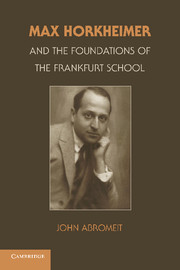Book contents
- Frontmatter
- Contents
- Acknowledgments
- A Note on References and Permissions
- Introduction
- 1 Coming of Age in Wilhelmine Germany
- 2 Student Years in Frankfurt
- 3 A Materialist Interpretation of the History of Modern Philosophy
- 4 The Beginnings of a Critical Theory of Contemporary Society
- 5 Horkheimer’s Integration of Psychoanalysis into His Theory of Contemporary Society
- 6 Horkheimer’s Concept of Materialism in the Early 1930s
- 7 The Anthropology of the Bourgeois Epoch
- 8 Reflections on Dialectical Logic in the Mid-1930s
- Excursus I The Theoretical Foundations of Horkheimer’s Split with Erich Fromm in the Late 1930s
- Excursus II Divergence, Estrangement, and Gradual Rapprochement
- 9 State Capitalism – The End of Horkheimer’s Early Critical Theory
- Epilogue
- Selected Bibliography
- Index
- References
7 - The Anthropology of the Bourgeois Epoch
Published online by Cambridge University Press: 05 June 2012
- Frontmatter
- Contents
- Acknowledgments
- A Note on References and Permissions
- Introduction
- 1 Coming of Age in Wilhelmine Germany
- 2 Student Years in Frankfurt
- 3 A Materialist Interpretation of the History of Modern Philosophy
- 4 The Beginnings of a Critical Theory of Contemporary Society
- 5 Horkheimer’s Integration of Psychoanalysis into His Theory of Contemporary Society
- 6 Horkheimer’s Concept of Materialism in the Early 1930s
- 7 The Anthropology of the Bourgeois Epoch
- 8 Reflections on Dialectical Logic in the Mid-1930s
- Excursus I The Theoretical Foundations of Horkheimer’s Split with Erich Fromm in the Late 1930s
- Excursus II Divergence, Estrangement, and Gradual Rapprochement
- 9 State Capitalism – The End of Horkheimer’s Early Critical Theory
- Epilogue
- Selected Bibliography
- Index
- References
Summary
Although Horkheimer’s reflections on materialism should not be seen as foundational in a strong or static sense, insofar as his thought was thoroughly historical and not ontological or metaphysical, they do present the most general, philosophical assumptions that informed his Critical Theory in the early 1930s. As we shall see in the following chapter, with his project on dialectical logic Horkheimer would continue throughout the 1930s to develop and refine the theoretical assumptions that guided his Critical Theory. Yet many interpretations of Horkheimer’s work in the 1930s have focused on the methodological reflections he puts forth in what have become his two best-known essays, “The Present Situation of Social Philosophy and the Tasks of an Institute for Social Research” and “Traditional and Critical Theory,” without adequately examining the philosophical reflections that underlay them. It was Horkheimer’s understanding of materialism and dialectical logic that informed his methodological reflections in these two essays, not vice-versa. This general focus on methodology in the reception of Horkheimer’s writings from the 1930s has led to a neglect not only of his important reconceptualization of materialism and dialectical logic, but also of his substantial contributions to fleshing out the positive content of Critical Theory. Horkheimer’s writings in the 1930s can by no means be reduced to abstract reflections on the methodology of critical, interdisciplinary social scientific research. With his concept of the anthropology of the bourgeois epoch, Horkheimer moves beyond and carries out concretely – at least in a preliminary way – his more general methodological and philosophical reflections. This concept captures Horkheimer’s understanding of the dominant character structure in modern capitalist societies and thus forms an essential part of the substance of his Critical Theory in the 1930s. In order to counter this widespread neglect of what must be seen as the core of Horkheimer’s Critical Theory in the 1930s, we will reconstruct Horkheimer’s concept of the anthropology of the bourgeois epoch with regard both to its historical foundations as well as its implications for a Critical Theory of European societies in the 1930s. We will begin with an examination of his methodological reflections, which are found primarily in the essays “The Present Situation of Social Philosophy,” “History and Psychology,” and “Remarks on Philosophical Anthropology.” We will then see how he fleshes out the historical content of these reflections in the essay “Egoism and Freedom Movements.” Finally, we will examine how the Institute’s collective Studies on Authority and Family represent an attempt to test Horkheimer’s working hypotheses about bourgeois anthropology in contemporary Europe and also serve as an important point of departure for his subsequent historical investigations in “Egoism and Freedom Movements.”
- Type
- Chapter
- Information
- Max Horkheimer and the Foundations of the Frankfurt School , pp. 248 - 300Publisher: Cambridge University PressPrint publication year: 2011



